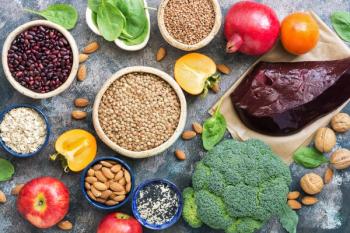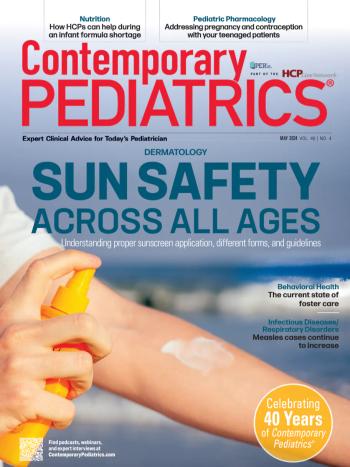
According to a new study, racial and ethnic disparities were evident when counseling on nutrition, lifestyle, and weight among children with high blood pressure measurements.


According to a new study, racial and ethnic disparities were evident when counseling on nutrition, lifestyle, and weight among children with high blood pressure measurements.

Colleen Sloan, PA-C, RDN, explores how diet can help manage childhood constipation.

Editor-in-chief Tina Tan, MD, FAAP, FIDSA, FPIDS, highlights the final Contemporary Pediatrics journal of the year.

Colleen Sloan, PA-C, RDN, unpacks the essential nutrient children are missing in their diets and how providers and parents can start implementing.

Colleen Sloan, PA-C, RDN, details how technology can affect eye health in children and identifies which nutrients can help mitigate its effect.

Colleen Sloan, PA-C, RDN, shares her tips for navigating the holidays while keeping an eye on your patients' nutrition.

In this article, Colleen Sloan explores key nutrition strategies that pediatricians can confidently share with families to help their young athletes perform at their best.

Tanya Altmann, MD, discusses California's AB 899 law requiring baby food heavy metal testing, urging a balance between safety and maintaining nutrition quality.

“Getting outside and enjoying the fresh air can do wonders for your health while also upping Vitamin D absorption, said Jessica McQuerry, MD, lead study author of an abstract presented at the 2024 AAP National Conference & Exhibition.

Those with inpatient food insecurity had an increased length of stay, as well as increased odds of readmission.

Sleep deprivation and impairment can significantly hinder childhood development, affecting cognition, school performance, mood, behavior, physical health, and overall quality of life.

Digital tools like health apps, texts, and telemedicine show promise in managing childhood obesity, but require sustained engagement for long-term impact.

Wondering how to counsel parents on keeping their child’s immune system healthy through nutrition? Check out these clinical pearls from Colleen Sloan, PPA-C, RDN.

As of July 19, 2024, there were 28 Listeria illnesses and 2 deaths linked to meats sliced at delis.

Summer is in full swing, meaning beach days, movie nights, and summer barbecues. Lunchtime staples like deli sandwiches are undeniably convenient and delicious. But with whispers of cancer risk swirling around processed meats, many patients wonder: is deli meat safe for my family?

Wondering what’s the best way to talk to children about their weight? Colleen Sloan, PA-C, RDN, provides some clinical pearls you can incorporate into your practice.

A recent poll reveals that teens primarily consume caffeine through soda, tea, coffee, and energy drinks, with parents expressing concern about the health risks associated with excessive intake.

Approximately 40% of patients who receive PN in the United States as an intravenous source of nourishment are under 18 years of age.

When breastfeeding is not an option, caregivers will turn to infant formulas to meet their child’s nutritional needs.

Editor-in-chief Tina Tan, MD, FAAP, FIDSA, FPIDS, highlights the April 2024 issue of Contemporary Pediatrics.

A poster session evaluated early evidence from the randomized controlled iREACH trial.

A recent nationally representative survey revealed what types of meals parents believe are healthy for their children, and how much food is the healthy amount.

A discussion of outpatient management and treatment of eating disorders in youth patients, plus the importance of a multidisciplinary team throughout the process.

Mothers who are overweight or obese are more likely to breastfeed for shorter durations or not breastfeed at all when compared to mothers of normal weight, according to new research presented in a poster session at the NAPNAP 2024 National Conference on Pediatric Health Care in Denver, Colorado.

What is the best way to bring up this often-sensitive topic so that children and caregivers can work together for optimal health outcomes?